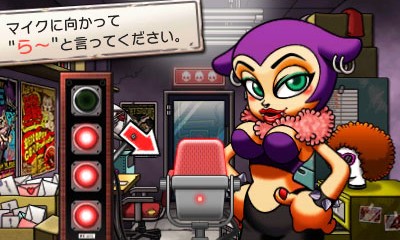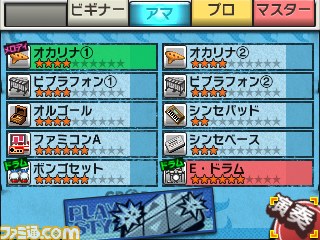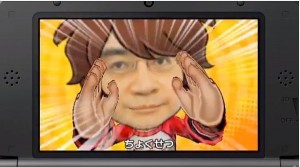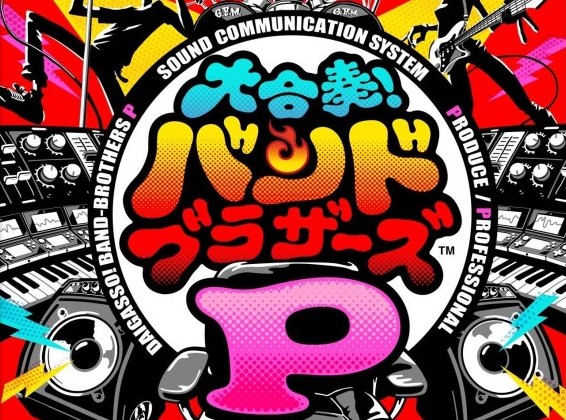[Famicompendium] Daigasso! Band Brothers P
Posted on August 9, 2015 by Patrick(@Patricklous) in 3DS, 3DS eShop, Famicompendium, Features
It’s been a long time coming, but Nintendo Everything’s longest-running feature with the lowest number of updates is back and ready to cover a whole new platform of import games. I not so recently bought a Japanese New 3DS while overseas so now I can actually write about games that came out during this decade. And now six months later I’m finally taking some time out from managing my Girls Mode 3 store and decorating my home menu with badges of Waluigi in a train to review my favourite Japan-exclusive 3DS title I’ve played so far – Daigasso! Band Brothers P. This game mixes rhythm gameplay with the ability to create and share your own composition to create a unique experience that’s unlike anything else on the 3DS. There aren’t many other games that do such a great job of making players feel like they’re part of a band – and without a single plastic instrument, too!

Band Brothers P was developed by good ol’ Intelligent Systems in 2013, but it’s part of a larger series that debuted on the Nintendo DS as a launch title. The roots of the series run even deeper than that, though. Band Brothers started out in development for the Game Boy Color under the name “Game Boy Music”, but limited controls and weak sound hardware of the Game Boy and later Game Boy Advance prevented the concept from being fully realized until the release of the Nintendo DS. While this first entry in the game was never released in English, its sequel ended up coming out in Europe under the name “Jam With the Band”, although very few people seemed to notice. Unfortunately, even with the recent release of Band Brothers P it’s incredibly unlikely that the series will ever make it to America, for a number of reasons I’ll get to later.
Band Brothers P is something of an iterative sequel, building on the same gameplay from the DS titles with a few new features and a different structure. Unlike say, every rhythm game Konami produced, the rhythm gameplay in Band Brothers isn’t a text of reflexes; it’s closer to reading sheet music. There’s a scrolling display with different notes corresponding to different buttons, but you can read fairly far ahead to keep track of any tricky parts and pre-emptively contort your hands. Since there are enough face buttons on the 3DS to add up to a whole octave, each button corresponds to a specific note, although this dedication to musical accuracy makes some of the tracks quite uncomfortable to play. Thankfully, there are multiple difficulty settings that cut down on the number of buttons or alternatively ramp up the intensity by adding in the shoulder buttons for raising and lowering pitch. There’s also no failure state; no-one will kick you off the stage no matter how badly you screw up a song, although the audience will get awfully restless.
Every song has up to twelve instruments to play as, each of which is marked with its difficulty level. Some instruments even come with different gameplay styles, like a guitar mode that involves holding chords with the D-Pad while strumming the lower screen. There’s also a new mode for drummers in this version, but it’s kind of a dud. Hitting panels on the touch screen just doesn’t faithfully replicate playing a drum kit and it’s impossible to play well unless you’re holding like three different styluses. Also underwhelming is the addition of vocal performances – singing is as simple as sliding a to catch falling notes. It’s a good mode for beginners, but it’s too easy unless you’re playing some insane operatic piece. It does however highlight one of Band Brothers P’s more interesting features, which is the use of Vocaloid technology.
Upon starting the game, the bizarrely-sexualised Babara the Bat takes both a photo of you and a sample of your voice, which is used to generate a little Vocaloid version of yourself. Like any Vocaloid it sounds a bit unnatural, but then so does the cacophony of MIDI instruments it sings over. These abominations are charming in the creepiest way possible; I could just be self-conscious about my appearance, but the bizarre juxtaposition of photorealism with the cartoonish mouth movement makes them quite unsettling. The tech behind it is cool, but boy am I no Hatsune Miku.
What even is a video game #rhythmmonth https://t.co/hRJuEPHORo
— Rolling Start (@Patricklous) January 16, 2015
So what kind of music is there in Band Brothers P? Not much, initially. The game only comes with a setlist of five songs and any others need to be bought online with tomatoes, Band Brothers’ virtual currency. Thankfully, the game comes with a voucher that provides enough tomatoes for 100 songs – if you can spend them all in time. Tomatoes in Band Brothers might have a longer shelf life than in reality, but they’ll rot after five months and become unusable, which I found out the hard way. It just goes to show that you should always read the fine print, even if it’s in Japanese.
The whole voucher thing only exists to dissuade people from buying used copies of the game. It should be obnoxious and I think the expiry date is unnecessary (Japanese law on digital currency says otherwise), but given how badly Band Brothers P bombed it’s easy enough to find new copies of the game priced under 1000 yen complete with the download voucher. The tomatoes are already reasonably priced, but a hundred songs for just ten dollarydoos? That’s not a bad deal.
You can download up to 3000 songs from a huge library of online tracks to pick from. Want to perform the Japanese Spider-Man theme tune? How about the opening to Wild Arms or practically every Love Live song ever made? Band Brothers P has you set. It’s a seemingly endless supply of songs that can even be searched through codes from databases like JASRAC, but not everything is permitted by the software. As expected, there’s a lack of English songs, too. Still, Nintendo did an admiral job of sorting out the rights to all the music available, though I can’t imagine Nintendo of America doing the same thing. Despite the game’s underperformance, new music is still being authorised; Nintendo recently allowed for arrangements of popular Touhou songs and music from the Fire Emblem series. Yeah, Nintendo can’t even get the rights to all their music sorted out.
What’s really neat about the system is how it emphasises every aging scholar who ever wrote a journal article on Second Life’s favourite word, user-generated content. Sure, there are a few tracks from composers at Nintendo (currently there’s free music from Splatoon and Fire Emblem Fates up for grabs), but most of them were created by other players using some surprisingly sophisticated software. Band Brothers P gives players all the tools they need to put together their own tracks, either through writing out sheet music or putting together guitar tabs. You can also make use of vocals by writing out lyrics and tuning them to your liking. It’s clear that Intelligent Systems was trying to appeal to the whole Vocaloid production craze with this feature and they pulled it off well; the tech is fairly easy to use, even if the included vocal banks aren’t suited to English phonetics at all.

It’s all too deep and time-consuming for me to really get into, but it resulted in a crazy amount of content and it should be rewarding for wannabe composers. Nintendo apparently gives out tomatoes to users who create or refer others to popular songs, and there’s a request feature to see how to most effectively pander to people. Still, there are some issues with creating and sharing songs, namely that the moderation is quite strict. By all accounts those ninjas at Nintendo will reject your application if even a single note is out of place or the title is formatted incorrectly. This does mean that only the most accurate arranged tracks are available for download, but I can see it being off-putting to more casual composers.
Nintendo recently released a cheaper “Debut” version of Band Brothers P on the eShop for 200 yen, which comes with five new songs installed but locks away the music creation tools. It also doesn’t come any tomatoes, so if you intend to download any songs, you’re probably better off just sticking with the dirt-cheap retail version. That said, this version seems to have reinvigorated the online multiplayer scene and I can now actually find a full ensemble of people to play with. It turns out that the multiplayer is much more enjoyable than I expected, mostly because of how committed the game is to making you feel like part of a band with the random players you’re matched with.

After being thrown into a group of up to ten people, you’re assigned a random band name and left to fight it out over instruments for a set of three songs. Once you take the stage you can shout out messages to your band members and give them words of support whenever they randomly appeal to the audience. Given that you can hear every member playing at once it’s easy to pick up on who isn’t keeping up, but the game has the shamed player popping up anyway so you can offer encouragement. I think every multiplayer game should follow Band Brothers P’s example and include a “apologise profusely to your teammates” button! Band Brothers P really nails the dynamic of a co-operative multiplayer game by encouraging everyone to outplay each other by highlighting the best musicians at the end (and shaming those who underperform) as well as forcing them to depend on each other to make beautiful music – everything starts falling apart the moment you get a dodgy drummer. Not that screwing up really matters, though; my experience playing online presented a friendly environment where everyone was really just playing to have fun. This casual atmosphere even extends to the end of the gig where everyone goes out for a round of congratulatory drinks.
The problem with multiplayer is that, at least when playing with random people, you only get three songs. And since only three players get to pick the songs, if you wind up with a large ensemble there’s a high chance that you won’t get much of a say in things. Still, the song choices are only restricted by the selector’s library, so it’s a fun way to test your sight-reading skills by playing music you haven’t heard before. If you like what you hear then adding the song to your shopping cart is just a button press away. Yeah, Band Brothers keeps on trying to sell you stuff, but it does so in an endearing way, like through the in-game radio stations.

I’m sure the music creation is enjoyable for some people, but to me Band Brothers P was all about the performance and the freedom to play however you feel like. You’re free to play just about any instrument and the tracklist is limited only by players’ creativity (and Japanese copyright law). There are even a bunch of odd modes, like one that uses a virtual acoustic guitar and the console’s microphone to simulate the experience of busking. It’s weird stuff like this that really made the game endearing to me – the freeform style of gameplay without much sense of progression. Scoring well and trying harder difficulty levels earns fans, which unlocks new outfits (that are also available as paid DLC, naturally), but it’s the joy of simply playing the game and checking out the constant stream of new songs that keeps me coming back. As far as Nintendo’s rhythm games go I’d rank Band Brothers P below Elite Beat Agents or Rhythm Heaven, but it’s still the first rhythm game I’ve played in a long time that I think really understands the appeal of the genre. And naturally the music licensing, reliance on Vocaloids with lousy English pronunciation and underwhelming sales means it won’t ever be localised. Prove me wrong, Nintendo!
Import friendliness: High, if you’ve got the console
The original Daigasso! Band Brothers was quite a popular choice among importers back in the day because it didn’t require much Japanese knowledge and this sequel is the same. The language barrier might make searching for and creating songs a bit tricky, though. The big issue with importing Band Brothers P is the console’s region lock. While there have been a number of exploits recently that allow for games to run in the wrong region, Band Brothers P is one of the few that can’t really be played through this workaround since you need to connect to the Internet to download anything beyond the initial five songs. Unfortunately, for now you’ll need a Japanese 3DS to play it properly.
Are there any other Japanese 3DS games you want to see covered before this column disappears into the ether once again? Let me know in the comments!
